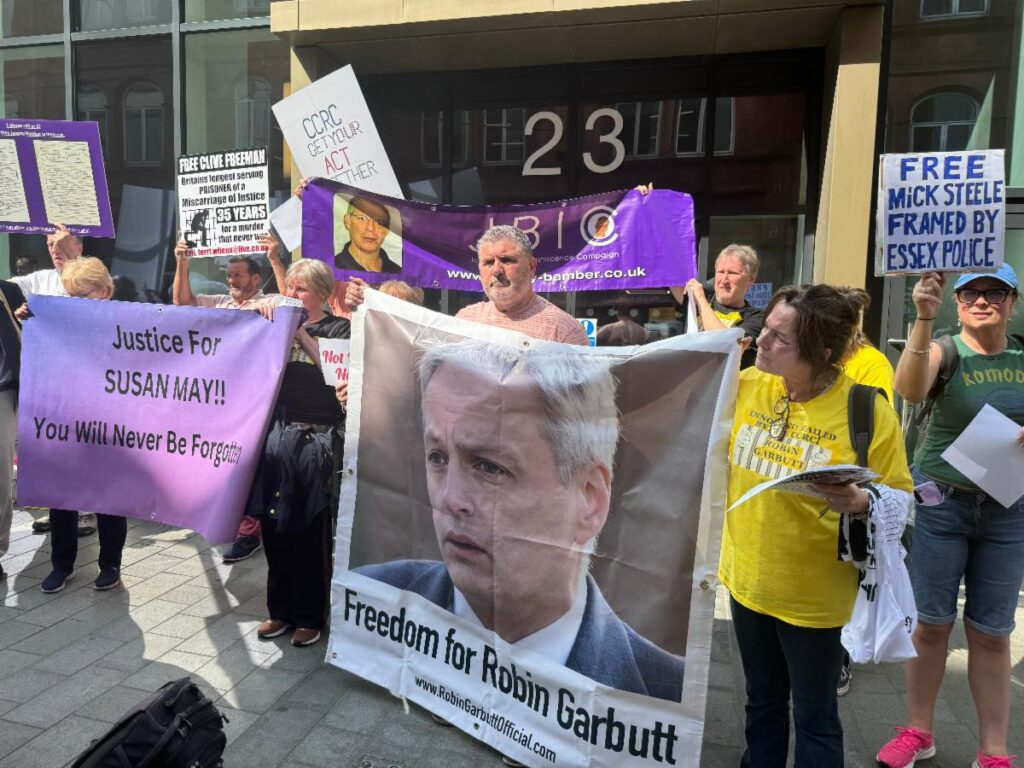Victims of miscarriages of justice protest at CCRC HQ

55 victims and supporters of people who claim to be unjustly jailed protested today, 10 May, outside the HQ of the Criminal Cases Review Commission (CCRC) in Birmingham.
Peter Tatchell delivered a letter to Helen Pitcher, Chair of the CCRC, calling on her to publicly respond to the issues raised at the demonstration. The letter urged swifter and fairer assessment of cases submitted by prisoners who are protesting their innocence and seeking a review of their convictions, including Jeremy Bamber and Luke Mitchell.
The protest was organised by the campaign group, Innocent: Failed by the CCRC – an umbrella group set up by the Jeremy Bamber Innocence Campaign (JBIC).
The protesters held placards including:
“Justice for Susan May. You will never be forgotten”. She died in 2013 and the CCRC has still not considered her case.
“Freedom for Robin Garbutt.” His case was submitted to the CCRC in 2015 but has still not been considered by the CCRC.”
“Free Clive Freeman. Britain’s longest serving prisoner of a miscarriage of justice.” He’s been in prison for 37 years proclaiming his innocence.
“Innocent! Failed by the CCRC!”
They chanted: “2-4-6-8! Don’t delay, don’t wait! 3-5-7-9 Give us justice. It’s time!”
Some wore t-shirts with the wording: “Innocent: Failed by the CCRC! Jeremy Bamber.”
The protest criticised the CCRC’s “delays, incompetence and bias against prisoners who have presented evidence of wrongful convictions”:
· Unacceptably long time it takes the CCRC to look at the evidence of the wrongful convictions they receive.
· CCRC’s connections to police forces and CCRC employees who are former police officers, and the potential bias this creates (the police, in effect, “marking their own homework”).
· Refusal to investigate cases properly and obtain relevant disclosure of evidence withheld by police.
· Refusal to pay for, or commission, forensic work (as happened in the recent Andrew Malkinson case and others).
· Moving the goal posts and delaying updates about their case work.
· Unjust refusals to refer cases to the Court of Appeal where evidence of wrongful convictions is strong.
Human rights defender, Peter Tatchell, said:
“The CCRC has failed to require Essex Police, and other public bodies, to disclose hundreds of items of vital evidence that were withheld at Jeremy Bamber’s original trial in 1986 and his subsequent appeals. He cannot have a new fair appeal until all evidence is made available to his legal team. The wholesale police suppression of evidence means that Jeremy Bamber did not get a fair trial. His conviction is unsafe. To give Jeremy a chance to remedy this injustice, the CCRC must insist that the Chief Constable of Essex, and others, comply in full with court orders to hand over all the undisclosed evidence to Bamber’s solicitors. For many years, it has failed to do so.”
Jeremy Bamber said:
“The Criminal Cases Review Commission came into existence in the 1990s, taking over from the Home Office department’s C3 Division, as a result of a spate of miscarriage of justice cases. In my view, the Commission was set up in a rush, and without due care and attention, with regard to how it would be staffed, or even what type of people might be allowed to work there.
“It is not known what vetting was, or is, carried out to ensure that potentially corrupt individuals can never be allowed to work for the Commission in any capacity. More importantly still, when the CCRC was set up, no one ever considered that investigations by the Commission’s employees may lead to them having conflicts of interest within the applications that they were examining.
“No one thought that there might be a requirement for an Ombudsman to adjudicate upon such matters, so nothing was put in place to oversee any potential difficulties with resolving disputes. No measures were, it appears, put in place to prevent corrupt individuals, or those with obvious conflicts of interests, working for the CCRC, with no Ombudsman being set up, resulting in no oversight of their work at all.”




